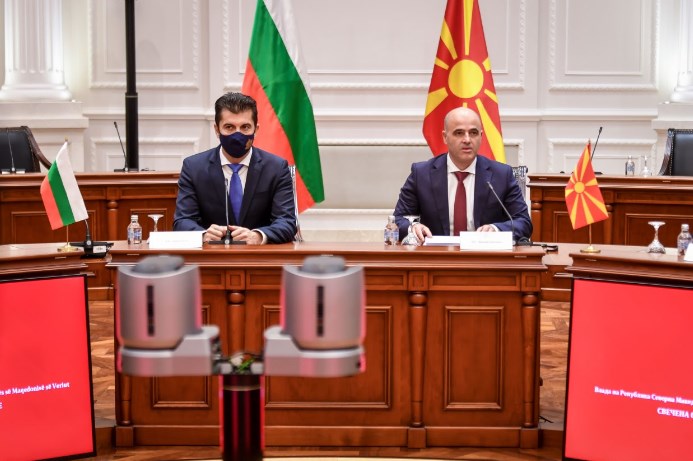The government assures that the identity and language are not negotiated with Bulgaria, pointing out that only working documents are exchanged in the talks and that when the final framework for a solution is determined, it will be published, while the opposition demands that the non-paper that was sent to Sofia in December be given to them, with the assessment that they are denied the right to make suggestions.
Prime Minister Dimitar Kovacevski said in an interview with the national broadcaster that the language and identity are neither discussed nor negotiated nor will be negotiated in the future.
At the moment, there are only working documents exchanged with the Republic of Bulgaria, which will be published when they are final and when the final framework is determined, which will be the way to a final settlement of the dispute we have with the neighboring country, Kovacevski said.
He confirmed that in terms of the talks, the country has clearly established positions in the Parliament, supported by all political parties and those positions are clear to the Government and MPs, political parties and all citizens.
Yesterday, Foreign Minister Bujar Osmani reported to the members of the Parliament’s Committee on Foreign Affairs on the course of talks and relations between Skopje and Sofia, which, as he said, are in the phase of non-paper exchange and no agreed proposals, assuring that the identity, language and other identity attributes are not negotiated.
When it comes to sensitive issues, I want to repeat clearly and loudly – no one negotiates the identity! Language and other identity attributes are issues that arise from the right of self-determination of every person, of every nation, of every ethnic community, of every state and it is an inalienable right stronger than any other right. We have not negotiated on these issues, nor do we have the right to negotiate, nor will anyone ever negotiate, Osmani said.
He stressed that through a wise, rational and reasoned approach, the Government managed to show that the theses for denying the Macedonian identity are retrograde phenomena, that they do not correspond to the modern values of civilization and that it succeeded in that.
According to him, the most sensitive issues are not subject to political negotiations, but they are subject to talks between experts in the joint Commission for Historical and Educational Affairs, which, as he said, is an independent body and in whose work “we can neither try nor try to interfere”.
For us, the most important issue in the package is the implementation of the decision of the European Council from March 2020, by holding the first Intergovernmental conference, and our key position is that in the negotiating framework, the Macedonian language should be treated as an official language of the European Union without any additional qualifications and questions asked by Bulgaria, said Osmani.
The chair of the Parliament’s Committee on Foreign Affairs, Antonio Milososki, after Osmani’s speech, pointed out that the non-submission of the working document regarding the negotiations with Sofia expresses distrust towards the MPs and prevents them from giving their contribution.
Osmani talked about building common positions, he talked about maturity, respect and mutual trust. How can we have confidence as MPs elected by the people, the MPs elected the Government, and the Government does not want to share with us a non-paper that was sent to Sofia in December. How to build those positions when you have written your opinion, an expert has supplemented that opinion, and you give us neither the right nor the trust as MPs to give a suggestion for that non-paper, which we want to be in accordance with the declaration which this Parliament adopted, says Milososki.
According to him, Osmani sets a precedent, because he confirms that there is a document that it is informal, that it is a working version, and denies the possibility for the MPs to give their contribution in that working version.





Comments are closed for this post.